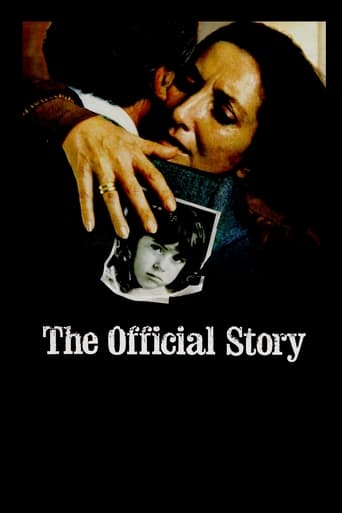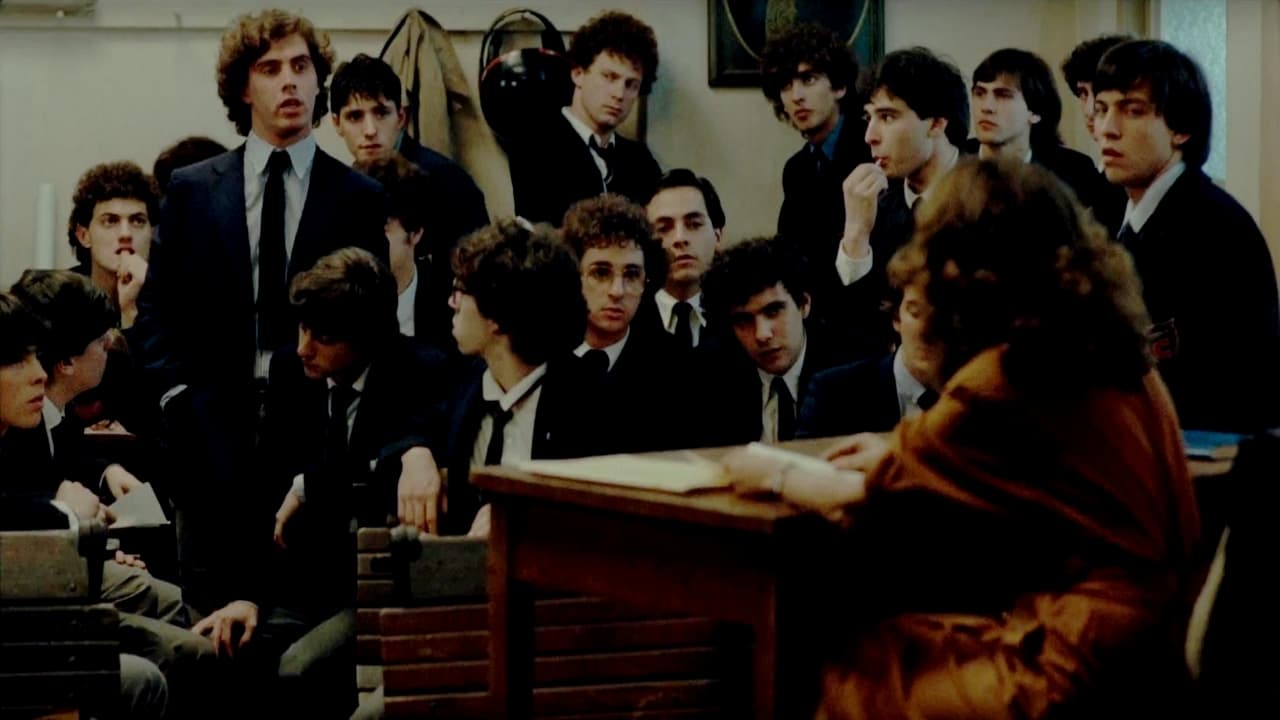Lee Eisenberg
In 1976, a group of generals overthrew Argentina's government and began a campaign of terror against the population. Thousands of people got kidnapped by the government, never to be seen again. These people are known as the Disappeared. Luis Puenzo's Academy Award-winning movie "La historia oficial" ("The Official Story" in English) focuses on this. The protagonist, Alicia, is an affluent teacher who has never taken much interest in politics. But the discovery that her adopted daughter might be the daughter of a disappeared woman forces Alicia to rethink her previously neutral view of the government.The movie reminded me of John Sayles's "Men with Guns", which also focuses on a middle-class person in Latin America who starts to reconsider his views. Indeed, Puenzo noted that the plot reflects Argentina's efforts to find out the full truth of its history (one of the protagonist's students even proclaims that "history is written by assassins").Everyone should see it. I suspect that this sort of thing happened in every country that saw a military junta seize power. The Mothers of Plaza de Mayo continue to congregate in the plaza to demand the truth about what happened to their children, while junta leader Jorge Videla got sentenced to jail in 2012 (he died the following year).
markdukesports
First off, let me get this through that this movie is not a bad movie. The acting is fantastic and I could really tell the pain that the characters were going through during the movie. I also like the premise and how realistic the problems were. However, for me there were two big problems that kind of ruined the movie for me. The first one is not that big but the second one really bugged me.The first problem is how confusing the plot was to me. Maybe it's because the movie is in Spanish and I had to rely on the subtitles but I had trouble catching on to the plot. For me the movie sequence was like: Gabby is adopted-I wonder who her parents really are- I think I found her grandmother- Her parents may be political prisoners- No wait, they might not be her parents after all. This is just a summary, but I dislike how the movie constantly nullifies its progress. The second problem for me was how the entire movie was built up for us to find out who Gabby's parents are, but we never find out. That bothered me because I had spent two hours trying to figure out the plot and hang on to every word to find the answer, but it's never given. That just left me feeling empty.Overall, this movie has a lot of great moments but what it doesn't give really takes away from the overall movie.
Samuel-Maldonado
This movie is easily one of my favorite Spanish films. It is a powerful story of an awakening from ignorance and the pursuit the truth, not from one of the disappeared victims of the Dirty War that traumatized Argentina in the 1970's, but of a middle-class history teacher who unknowingly supports it. As the story unfolds, we learn more and more that those closest to her may have the most to hide, and we are made painfully aware that ignorance does not excuse us from our responsibilities to justice and humanity. The drama and mystery are thick, almost tangible, and will keep you enthralled until the last shocking, eerie moment.
Irving Gamboa
Although it seems that the film "La Historia Oficial" was an attempt to mock the contemporary style of its cinematic American competition, I believe that stylistically the film is not American; however, its melodramatic content is purely American. I despise melodramas mainly for one reason: melodramatic films tend to "use" highly polemical historical, sociological, cultural or geographic issues as a mean to intensify their weak content. Thereafter, a sudden, supposedly intense, "problem" arises; such problem is usually a romantic microcosm of the main source (what I referred to as the polemical source), which it drains and diminishes. American examples of this travesty are: Casablanca, Titanic, and All that heaven allows.Stylistically La Historia Oficial is a very Latin film: the lighting is very similar to that of "El callejón de los Milagros", while the cinematography is not as preoccupied with constant flamboyant takes, and the editing is not as conventionally "fluid" as that of American melodramas. The opening of the film is a metaphorical depiction of the entire story: A deceiving shot that simulates emptiness and isolation (the mental, spiritual and political state in which the Argentineans found themselves at that period of time). But as the film zooms out of focus we are surprised to see that below the camera focus, hundreds of students stand waiting to recite their National Anthem. The use of longs shots reminds me more of European than American films.Thematically the film's focus is to represent the turmoil and corruption that Argentina suffered during the "Dirty War". The main family is used as the melodramatic microcosm to represent an entire culture
an entire Nation, but this trick worked subtler than it does in the majority of melodramas. For this reason I enjoyed the film: because the duality represented by the two social structures (those above and those below) was interestingly analogous to the dichotomy of female and male, wife and husband, good and evil. The anarchistic undertones of the film interested me: while Alicia represented the rigid, formal and intellectual part of society, her blindness to truth is almost unbelievable because of her faith in facts. Slowly she begins to reject the corrupted ideals she once saw as truth and realizes that there is another greater truth: the reality that occurs yet is ripped from the history book, for history is usually written by the Assassins. Her rejection of social institutions (education, religion, and family) convinced her that conventional society is a blind organism. On the other hand, her husband, Roberto was concerned with elevating in the social ladder regardless of consequences, which is a way of attempting to do "good" by disregarding evil. Because of Roberto's blind and cruel conviction, Alicia realized that all of history is fiction, and for once she understands and experiences the truth.Although the representation of the greater truth through this family was well done, the ending was the most hindering point of the film because nothing was resolved. This sad reality of such interesting film contradicts Fernando Birri's idea of what Latin American Cinema should be: "
This is the revolutionary function of social documentary and realist, critical and popular cinema in Latin America. By testifying, critically, to this reality to this sub-reality, this misery cinema refuses it. It rejects it. It denounces, judges, criticizes and deconstructs it. Because it shows matters as they irrefutably are, and not as we would like them to be
". This sad terrible truth applies to Luis Peunzo's interpretation of that sub-reality and misery in which his country crumbled. Incredible flashes of an ultimate truth appeared in his cinematic vision
but the viewers were simply teased, like a young boy hypnotized by a glorious belly-dancer, who at the climactic moment decides to retreat from her art. "La Historia Oficial" depicts a great truth, yet it veils it in order to appeal to a greater audience. The film lies in order to win the warmth of acceptance and to receive trivial applauses. Even though it is clear that the Nation was left in chaotic turmoil and irreparable hopelessness, the "systematic and conventional" cinematic format the film had to apply to, forced the filmmaker to end in a happy/inscrutable manner
it is obvious that if the film ended in a tragic form its wouldn't have been accepted as well by the American audience, whom the film was targeting after all.


 AD
AD

